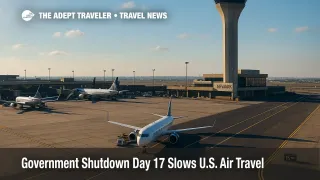Government shutdown day 17 slows U.S. air travel

The federal funding lapse is now in its third week, and its effects are compounding in the air system. The FAA's daily plan shows targeted risk periods at Newark Liberty International Airport (EWR), San Francisco, Boston Logan, and other hubs, while controller shortages and fatigue continue to amplify slowdowns. Travelers should prepare for pop-up ground stops and ground delay programs on short notice, plus longer security lines where overtime is constrained.
FAA ATCSCC operations plan, hour by hour
The Air Traffic Control System Command Center's plan for October 17 outlines specific windows where traffic initiatives could trigger. After 200 pm ET, San Francisco's low ceilings may require programs until conditions clear, and Boston's winds could necessitate controls after 100 pm ET. Newark appears again as a recurring risk after 12:00 pm CT as New York winds build. Austin is under Formula 1 volume monitoring through October 21, and late-evening Houston risk is noted. These targeted windows reflect a system managing volume and weather with fewer spare hands, which reduces flexibility when equipment or weather blips appear.
Latest developments
Earlier this week, Los Angeles International Airport saw a stop-start caused by an FAA equipment outage, underscoring how thin staffing and maintenance slack can turn routine faults into broader delays. Airlines, including United, have warned that the prolonged funding lapse is eroding confidence and exacerbating an existing controller shortfall.
Analysis
Expect the bottlenecks to move with the weather and the clock. The hour-by-hour FAA plan points to mid-afternoon pressure in the Northeast and San Francisco, with additional pop-ups possible if winds cross thresholds. Controller availability is the system's limiter during a shutdown; spacing increases and flow programs become more likely, which is why small schedule slips can ripple faster than usual.
Security checkpoints remain staffed, but without reliable overtime in some locations, peaks will sting. Build buffer time at morning and late-afternoon banks, use PreCheck where eligible, and keep your app alerts on for rapid rebooking.
Recent airline change-fee waivers tied to last weekend's nor'easter covered New York area and Boston itineraries on multiple carriers, with most windows closed by mid-week. Today, waivers are limited and primarily weather-specific; monitor your carrier's alerts page. For rolling delay coverage, see our daily tracker in Flight delays and airport impacts: October 17, 2025. For background on how the shutdown is reshaping travel operations, see our earlier brief, Government shutdown travel impacts, what is changing now.
Final thoughts
The government shutdown day 17 is not grounding the system, but it is shrinking its margin for error. With winds in the New York area, lingering coastal weather, and peak-hour volume, the FAA will likely lean on ground stops or delay programs in short bursts. Arrive early, travel light, and keep an eye on your airline's alerts as government shutdown day 17 continues to slow U.S. air travel.
Sources
- Current Operations Plan Advisory, FAA ATCSCC
- NAS Status, view operations plan and active initiatives, FAA
- LAX ground stop due to equipment outage on October 12, Reuters
- United warns shutdown is undermining operations and demand, Reuters
- DOT contingency plan for lapse in appropriations, first-party PDF
- U.S. Travel Association statement on shutdown impacts
- Delta weather exception, East Coast, bulletin archive
